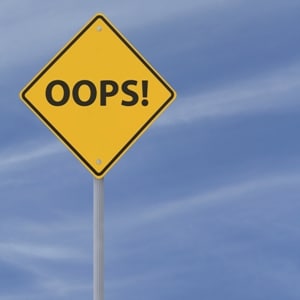
In fact, admitting to the mistake may actually diffuse the matter. What people remember is how you handled it. Every mistake is an opportunity to demonstrate your integrity and improve your business.
We once had an employee who, every time he blew it would say, “I’m doing the best I can.” We’d answer, “Yes, but are you willing to improve?” And that is the real issue. It requires change. So it’s really not about the mistake so much as it is about improving. Why waste a perfectly good mistake?
Here are some suggestions we found to handle your next boo boo:
1. Cop to it. The sooner you admit to the error, the more you reduce the drama and the faster you can move on to the next, more important stage: what you are going to do about it. People actually like a little imperfection now and then. It demonstrates a level of authenticity, vulnerability and humanity with which we all can identify.
2. Recognize how it happened. Detrimental issues that are never discovered will reoccur. If it is just swept under the rug, like it never happened, what is there to investigate? Denial is far too common in large siloed organizations where you can be demoted, passed over, or even fired for a mistake. But real progress is often built on the back of those mistakes. That’s why progressive companies give their people permission to make mistakes (within reason, of course).
3. Aim, don’t blame. It’s easy to point your finger at the other guy, and it may well be his fault, but if it happened on your watch and you are accountable for the finished product, it is ultimately your responsibility. By taking personal responsibility, you make it impendent upon yourself to get to the bottom of the situation. Aim at what you and your company can do on your end to prevent it from reoccurring.
4. Write it down. Don’t just quickly solve the situation on a one-time basis, then rub your hands together and put them behind your back like, yes, it happened, but it’s all cleaned up now. If you don’t write it down, even you may make the same mistake again, and certainly others will as well. Write a new procedure, checklist, or sign off sheet. Draft a new clause in a contract. But write it down!
5. Resolve that it won’t reoccur. Along with your apology, assure the injured parties that it won’t happen again. Describe how it happened and what changes you are implementing to prevent its reoccurrence. Tell them how you and your company are going to make it right. Most people will appreciate your thoughtfulness, resolve, and the action you are taking.
Mistakes are bound to happen. Don’t miss out on a golden opportunity to show your integrity, reduce the drama and improve your business. Just say, “Oops, my bad,” and take action. The injured party will have more respect for your company, and your company will improve. That is how you make mistakes right.
Who We Are

Michael Houlihan and Bonnie Harvey co-authored the New York Times bestselling business book, The Barefoot Spirit: How Hardship, Hustle, and Heart Built America’s #1 Wine Brand. The book has been selected as recommended reading in the CEO Library for CEO Forum, the C-Suite Book Club, and numerous university classes on business and entrepreneurship. It chronicles their humble beginnings from the laundry room of a rented Sonoma County farmhouse to the board room of E&J Gallo, who ultimately acquired their brand and engaged them as brand consultants. Barefoot is now the world’s largest wine brand.
Beginning with virtually no money and no wine industry experience, they employed innovative ideas to overcome obstacles, create new markets and forge strategic alliances. They pioneered Worthy Cause Marketing and performance-based compensation. They built an internationally bestselling brand and received their industry’s “Hot Brand” award for several consecutive years.
They offer their Guiding Principles for Success (GPS) to help entrepreneurs become successful. Their book, The Entrepreneurial Culture: 23 Ways To Engage and Empower Your People, helps corporations maximize the value of their human resources.
Currently they travel the world leading workshops, trainings, & keynoting at business schools, corporations, conferences. They are regular media guests and contributors to international publications and professional journals. They are C-Suite Network Advisors & Contributing Editors. Visit their popular brand building site at www.consumerbrandbuilders.com.
To make inquiries for keynote speaking, trainings or consulting, please contact sales@thebarefootspirit.com.






